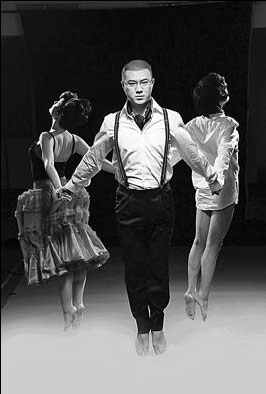Play with a message: Hell is other people
Updated: 2013-03-08 07:33
By Zhang Kun in Shanghai (China Daily)
|
|||||||||||
|
The Chinese production of Jean-Paul Sartre's play No Exit portrays three deceased characters in a locked room. Provided to China Daily |
The new Chinese production of Jean-Paul Sartre's play No Exit is a ghost story rather than a complicated philosophical explication.
Directed by Liu Shuchen, the play will be staged at Shanghai Dramatic Arts Center from March 7 to 24. It marks the opening of a "Post Wave" campaign, when 24 small-theater productions will be staged at SDAC in the coming two years.
Shanghai Dramatic Arts Center chose No Exit as the opening project for "Post Wave" because it is a work of vitality, says Zhao Lian, the play's producer.
"People sometimes say 'hell is other people', but young audiences may not know the context of the quotation, or the real meaning," Zhao says.
In 1998, the center's production of No Exit was well-received and is recalled as a landmark at SDAC.
"We want to create a new reading and hope today's audiences get fresh ideas from it," Zhao says.
The French philosopher Sartre wrote the play in 1944, and it tells of three deceased characters together in a locked room.
Joseph Garcin is an army deserter, who blatantly cheats on his wife. Ines Serrano is a lesbian postal clerk, who turns a woman against her husband, and causes his death. Estelle Rigault is a blonde "gold digger" who marries an old man for the money, while having an affair with a younger man.
The three of them talk, fight, seduce, manipulate and even try to kill each other in the locked room, until they reach a conclusion that the punishment for their sins is enclosure with each other - hence, hell is other people.
"It gives me a headache when people keep asking me, 'What is existentialism? What is the philosophical idea of the play?'" says actor-turned-director Liu, 31.
"I spent lots of time reading the play and other Sartre works. I consider myself to be a student sharing with audiences what I learned from Sartre, and tell the story of the play as we understand it."
Instead of picturing the three characters simply as the coward, the prostitute and the manipulating lesbian, Liu wants to present their life stories and what makes them the way they are. "We want to find the root of the suffering for these ghosts - the love, pains and struggles they went through when they were alive," Liu says.
To do this, the play will create a stage design "completely different from the original", Liu says. "The idea behind such a design came from Sartre, of course."
Small-theater productions are different because audiences sit close to the actors' performing area, says Zhao, the producer.

"Audiences are able to clearly see each posture, facial expression and even breath of the actors - the communication between them is more real and intimate," she says. "Plays focused on the presentation of inner struggles fit small-theater spaces better."
Zhao is also a playwright. Her adaptation of Simone de Beauvoir's feminist work, The Second Sex, will be presented in the "Post Wave" series in the latter half of this year, to be directed by Wang Xiaoying from the National Theater Company of China.
zhangkun@chinadaily.com.cn
(China Daily 03/08/2013 page20)
Today's Top News
Police continue manhunt for 2nd bombing suspect
H7N9 flu transmission studied
8% growth predicted for Q2
Nuke reactor gets foreign contract
First couple on Time's list of most influential
'Green' awareness levels drop in Beijing
Palace Museum spruces up
Trading channels 'need to broaden'
Hot Topics
Lunar probe , China growth forecasts, Emission rules get tougher, China seen through 'colored lens', International board,
Editor's Picks

|

|

|

|

|

|






